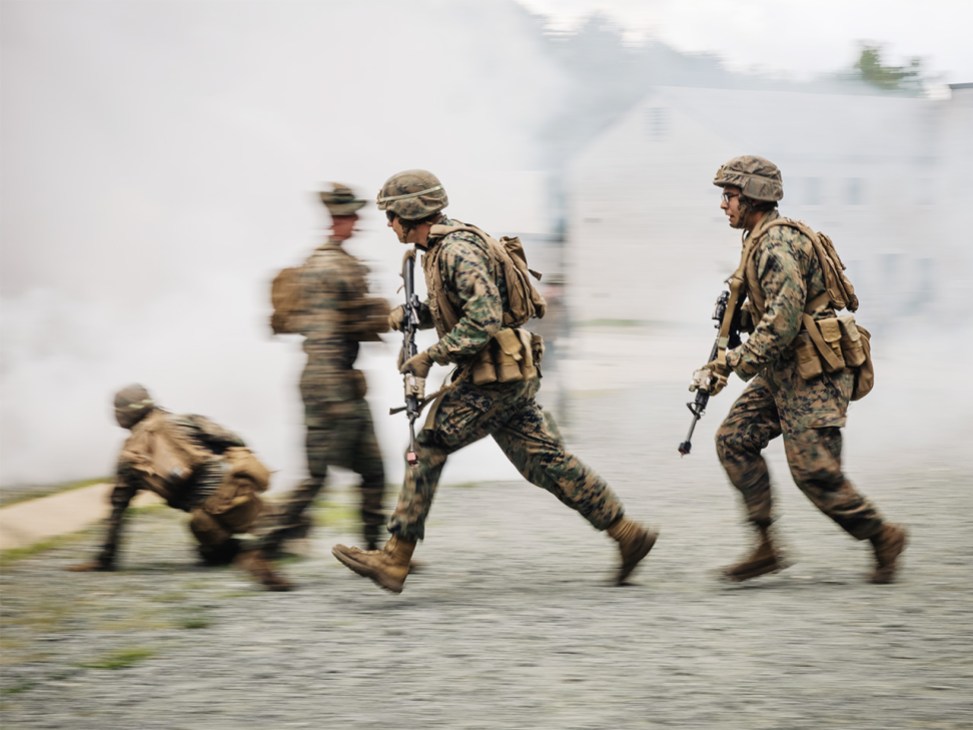Quantico’s trainee US Marines aren’t ready for trumped up domestic duties
The Marine Corps’ famed Basic School is evolving. Under Trump, recruits face new orders that blur the line between overseas warfare and domestic operations. Monocle visits the base to observe.
A good few hours’ hike from the sprawling Marines Corps Base Quantico in rural Virginia, US president Donald Trump and his secretary of war, Pete Hegseth, addressed the military’s top brass on Tuesday. It was a highly unusual gathering of US generals, who had flown in from command posts all over the world to be told by Hegseth that their troops should shave properly – “no more beardos” – and endure training that is “scary, tough and disciplined.”
None of this would be news to the recruits being put through their paces at The Basic School, a gruelling 29-week program at Quantico that gives the men and women selected as Marine Corps officers the fundamental grounding to lead troops into battle. “If they’re not tough, they’re going to get tough after being out here, that’s for sure,” said Captain Oliver McKellips just before three companies of Marines launched their deafening assault on Mout Town, a series of eerily empty structures deep in the Virginia woods built to replicate a small urban settlement.

The commander-in-chief’s Virginia visit came as the Marines are undergoing a 10-year modernisation drive that’s aimed at getting up to speed with adversaries such as China. However, with Trump finding new threats on both foreign and domestic soil, the elite force is not just having to contend with a changing world but also with shifting political sands at home.
Monocle was among a group of foreign journalists invited to visit Quantico’s almost 24,000-hectare base to observe tactical training. A company of Marines crept through the woods before smoke grenades flew, gunfire cracked and the soldiers stormed the windowless concrete structures, clearing rooms with enthusiastic cries.
The mocked-up city is a curious place, reflecting the Marines’ changing priorities. It was built during the Cold War and its structures roughly resemble a European town. But the signs above the doors are in Dari, the language of Afghanistan, a key 21st-century battleground for this elite military branch known as the tip of the spear in foreign operations.
This moniker makes some of their recent deployments rather unusual. In June the Pentagon deployed 700 Marines to Los Angeles to assist in quelling protests – the first such domestic deployment of Marines in 33 years. On Saturday, Trump declared that he would be deploying soldiers to “war ravaged” Portland, Oregon, where they were authorised to use “full force”. Speaking at Quantico, Trump made clear that the military would have a greater role in the domestic theatre. “What they’ve done to San Francisco, Chicago, New York, Los Angeles, they’re very unsafe places and we’re going to straighten them out, one by one,” he said. “That’s a war. It’s a war from within.” What is more, Trump has also deployed Marines to the Caribbean, where they’re supposedly targeting alleged drug-running cartels from Venezuela and the US-Mexico border.
What exactly will change at The Basic School remains unclear. As is to be expected from serving military officers, the trainers declined to be drawn into a political discussion. “We’re focused on giving the Marines, the leaders, the skills to succeed and then trust that our leadership will point us in the right direction,” said Lt Col Michael Breslin, the school’s war-fighting director.
But the edicts from the top will have an inevitable effect. If the Marines continue to deploy domestically, there needs to be training in law enforcement, crowd control and an understanding of the legal limits and rules of engagement on home terrain, where they can’t in most circumstances make arrests or search individuals.
The Marines are primarily trained in lethal force, rather than quelling civil unrest, and clear parameters would need to be set about their role in US cities. Working with different law-enforcement agencies presents other challenges, with different codes of conduct and communications standards. Hegseth might obsess about sending clean shaven “war fighters” into combat zones but most Americans probably didn’t expect the next war on their doorstep.
Charlotte McDonald-Gibson is a frequent Monocle contributor.
Read next: How militaries are using clever tactics to recruit a generation that won’t fight



